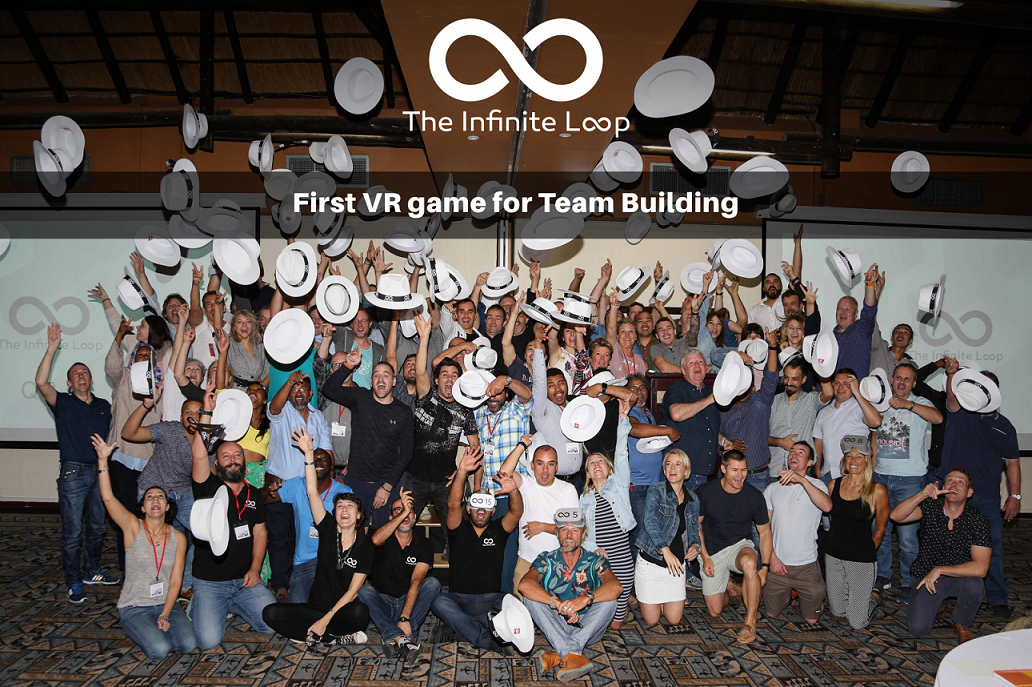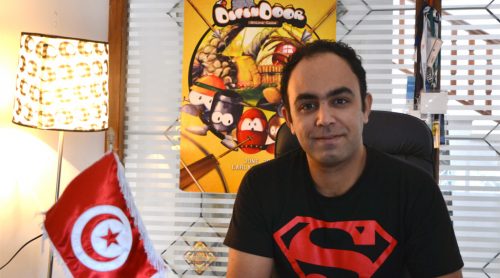
Walid Midani – a young Tunisian video game enthusiast – had no budget when launching his start-up with a group of his colleagues around 10 years ago. His father agreed to support their “company” by giving them free office space to work in and started earning an extremely modest income of 5 DT (equivalent to two dollars at that time) in order to buy some food and drink to sustain themselves night and day to making video games. Two whole years passed in this manner until DigitalMania Studio released its first game, a major failure commercially and financially. While a disappointing experience, it did not deter Walid and his friends from continuing to work and achieve their passion for bringing Tunisian video games to the world market.
From player to creator
Walid Midany – company founder – says in an interview with MIT Technology Review Arabia: “I grew up in a technology-loving family, and my father worked for an information technology company, while my mother was an IT specialist at a bank. Born in the eighties, I grew up surrounded by technological developments, most importantly the introduction and expansion of the internet in the nineties.”
Midani was accepted into ESPRIT-Tunisia in the capital upon its founding in 2003, in addition to 30 other students enrolled at the university (currently, however, enrollment stands at 10,000 students). Midani attributes a great part of his success to the opportunity of studying at this institution.
He says: “What distinguished ESPRIT from all other universities was the ‘spirit’ that the founders wanted to instill in the students. We were allowed to do anything we wanted, we could enter the campus at any time to experiment and explore, to fail and to learn from our failures.” This ability to stay up late hours into the night and learn programming languages with his friends, as well as discover computer games is what allowed his passion to flourish within a short period of time.
He adds: “My three friends and I quickly became bored of playing with our university classmates, a class of no more than 30 – 60 people, so we decided to start a video game competition between Tunisian universities called ‘Esports Tunisian Cup’.” The competition became vastly popular, with 15,000 audience members and players.
The event was stopped in 2008 after the global financial crisis, forcing video game companies to stop fans from organizing tournaments. Waleed was severely disheartened by this, as he says in his comment: “We have the talent and ability needed to organize major video game activities, but we didn’t own the games themselves. This is why I decided to make the games I wanted for myself.”
Educational journey
Midani didn’t want to only learn to program games – his university specialization was IT systems and networks engineering. Due to the lack of video game development in Tunisia, as well as no investment culture in such start-ups, getting financing for his project from any other source than his personal funds was impossible. With this in mind, he and five friends began working day and night on their first game, with only enough money to buy a sandwich and a drink, for two whole years.
Midani says: “these two years were the best of my life – we didn’t have any money, but we were building our very own project from nothing, and we were learning something new every day. We were told we were crazy, and that what we were doing ‘was not work, but childish play’, but we didn’t care.” He and his friends succeeded in launching their company officially in 2011, working for a year and a half more before making their first original game called “Defendoor”.
The team worked on the game with great enthusiasm, wanting to reflect the unique Tunisian culture and presenting it to the world. They filled it with references and idioms from the local dialect, and Midani had complete faith in the expected success of the game that he spent the entire company’s capital on it, the capital they had gained through a bank loan. The game was launched on December 12, 2012, and received only a limited number of players, ending up a major financial loss.
Midani comments: “This game was an experiment from which we learned game design, and we spent all the money we had to learn how to make games. It wasn’t an immediately profitable transaction, but we showed the world what we were capable of making.”

DigitalMania Studio, after this bad experience, moved towards creating more commercial games. At this time, gaming applications for mobiles were in huge demand, games that allowed companies to promote themselves and their products. Midan and his colleagues seized upon this opportunity and began developing games for these companies, earning them some profit that they invested towards developing their own original games. It was at this point that they realized that only the latter type of games were the ones they really wanted to work upon.
A new start for Tunisian video games
Midani says: “This was a difficult period for us – not financially, but in terms of morale. We felt that we had lost the spirit and culture of the company. It was at this point that we received an offer from a major European video game company to buy DigitalMania Studios. We had to discuss the matter internally with the team for six months, and the deal failed eventually for a number of reasons.”
This caused a major personal epiphany, as he “fell in love with his company” once again, and believed in the importance of the role it plays and the products it put forward. This is why DigitalMania Studios started creating original games again, putting aside the more commercial games production.
The company came back with a passion for its original productions, and the first of the games made was “Tunis 2050”, a game based on a satirical series of four seasons that presented an image of the capital after 30 years. the game reflected local culture very clearly, and went back to producing content in a variety of Arabic dialects, including Jordanian (in cooperation with production studio Kharabeesh), Palestinian, Kuwaiti, and Saudi dialects.
DigitalMania has also released one of its most important targeted games: “Infinite Loop”. The game relies on virtual reality technology in developing cooperative and team-building skills in a work environment, incentivizing players to take risks and developing cooperative work skills to win against an opposing team. The game is now played by over 5,000 users in 17 countries, a major achievement considering that the game is directed towards the professional work environment only.
Since its founding, DigitalMania has completed 128 games, an astounding number considering that the Studio only has 22 employees in an economically developing country, as well as the fact that some of the games are being distributed among a currently small audience. The company is now working on its next major project: “Warshmallows”, for which the DigitalMania team will employ all they have gathered in experience and knowledge from the last seven years, despite the fact that most of the game’s details remain unannounced.
Midani looks to the future with optimism and attributes the companies past and upcoming success to his team, which is still fueled by energy to release creative, successful games from an Arab market to a global audience.
This article was originally published in Arabic on technologreview.ae. You can read it here:
ديجيتال مانيا: أول ستوديو تونسي متخصِّص في صناعة ألعاب الفيديو
